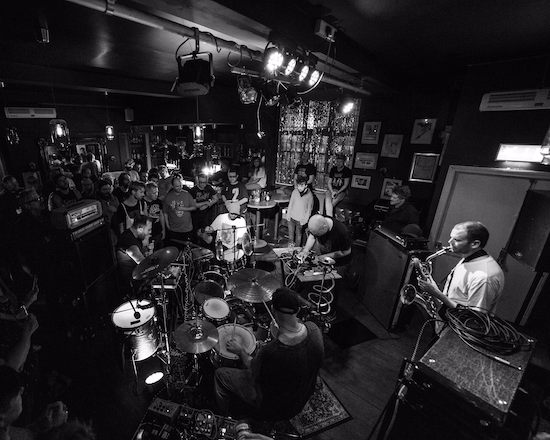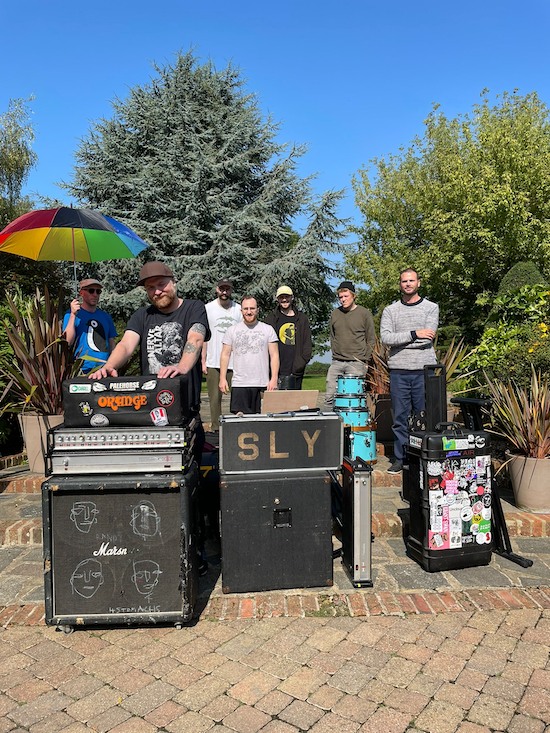To receive Singularity track ‘Every Knife In This House Is Mine’ by Sly & The Family Drone become a Quietus Sound & Vision subscriber
Despite there being much love for them in the underground, Sly & The Family Drone still seem a little overlooked. Okay, their jazz-tinged brand of abstract noise music isn’t everybody’s cup of intensity, yet where similar or even lesser-known bands have been meticulously documented, nobody’s even bothered to make them a Wikipedia page. Nor is there any ‘Biography’ entry for them on the AllMusic website, an otherwise "comprehensive" (or so it says) music resource. On Discogs, they’re summarised as a "Drum, tape and oscillator noise band from Basingstoke, UK". Even that needs updating.
The band started out as Matt Cargill working alone to create sound collages by splicing, respooling and manipulating old cassette tapes. When Cargill realised he could get his friends into festivals for free by recruiting them as drummers, the line-up began to expand. "There have been so many people involved over the years that even I would struggle with the actual timeline," he says. "Over lockdown, I was talking to Dom from Workin’ Man Noise Unit and I think he’d catalogued their entire gig history. With Sly there are, like, years where I honestly couldn’t tell you. It sort of all rolls into one. We absorbed people, and people came and went."
Their current membership (responsible for 20-minute behemoth ‘Every Knife In This House Is Mine’, now available exclusively to tQ’s Sound & Vision subscribers), consists of Cargill (electronics/voice), Kaz Buckland (drums/electronics/alto sax), Ed Dudley (electronics/voice) and James Allsopp (baritone sax). Together, they used the Quietus commission as an opportunity to work in a slightly different way. They’re joined by Will Glaser (who’s played at their recent double-drummer live shows) and Alex Bonney who performed piccolo trumpet on the song and also helped in recording, mixing and (as Cargill puts it) "fettling the recording sessions into shape." Its arrangement was a little more mapped-out than the band’s all-out improvisations. In the middle section – which sounds at various points like a cash register undergoing major dentistry, a game of pick-up sticks played using surgical instruments, or perhaps the strangest bits of Fantômas’ Delìrium Còrdia brutally stripped of its guitar parts and vocals – Cargill can be heard manipulating Glaser’s live drums in real time. "It was nice to be able to do all that spatial and stereo stuff which we wouldn’t be able to do live," he says. "Because of mics on drums and stuff, it just doesn’t really work in that way. So we were able to spend a bit of time just working on that and doing some quite weird-sounding drum stuff which I’m really happy with."
The passages of manipulated drumwork are bookended by the band performing together in full skronking and lumbering flow and, in a move that vaguely echoes the ecstasy of their live sets’ endings, it finishes with a warm and symphonic cacophony of horns. "It’s kind of a pieced together track but I think it works as an entire piece," reflects Cargill. "I’m loth to use the word but I feel that albums, and even live sets, should have a narrative of some sort. That reminds me of Limmy. He always complains about that word. ‘Fucking narrative!’ Conspiracy theorists use it as well: ‘This is the narrative…’ I’m using it in an actual literary sense. We’re saying our piece but you might not interpret it in the same way, and I like people to be able to have that experience, or for it to be an imaginary soundtrack to whatever it conjures up for them. That’s the thing with experimental, instrumental music. It’s all there to fill in."

Like the band’s name, the title of the new track comes from a random, overheard phrase. When deciding what to call it, Cargill first considered using a Viz reference. "Given the track length, I also thought about that post-rock trope of having an extremely long title for an extremely long song. The last track on our first album was called ‘A Man That Could Look No Way But Downwards, With A Muck-rake In His Hand’. I thought maybe it wants something like that. But it’s not." In the end (and just moments before our conversation, it seems), they settled on ‘Every Knife In This House Is Mine’. "It doesn’t come from a personal experience," says Matt. "But I remember hearing that phrase and thinking, ‘Fucking hell, that could mean… a lot of things.’”
Like many classic noise bands before them, Sly & The Family Drone choose to play on the floor of their venues whenever they can. "I prefer not to play on a stage," explains Cargill. "I feel like there’s a bit of disconnect if you’re up there." There’s a different "atmosphere, environment and dynamic" when they’re up close to people and surrounded by amplifiers.
The band are also prone to handing out drums, things to hit them with, and other bits and pieces so the audience can accompany them during the climatic end of their loud and lively sets. This tradition began at an early show at the Woolfire Festival near Winchester, when Sly was still a two-piece. Cargill remembers there being lots of small kids and young families in attendance, so he started dishing out the drums to one and all. More people grabbed rubbish bins and made makeshift instruments of other inanimate objects to join in too. For a band with an often harsh, abrasive and amorphous sound, it makes for a joyous and egalitarian experience.
"It doesn’t happen at every gig," he warns. "And I don’t want it to become a thing that people expect or are disappointed when we don’t do it. There are times I’ve seen people write, ‘Bring your drumsticks!’ I’ve never said that and I don’t want you to do that! If we were doing it every night people would be, like, ‘Oh, fuck off! They’re doing their schtick.’ We’re all playing inwards, facing each other, playing off each other. If it feels cool and it’s heavy and enjoyable then that might spill out. I like to be among people and to have that connection. I don’t know what it is that people get from it but if, sonically, it has got to this state where people feel that intense or euphoric feeling, if they feel strongly that the rhythm’s happening and it feels right, then that’s a nice moment. But if it’s not feeling right in the room, we wouldn’t force it."

Photo by Mikey Wheeler
Perhaps slightly less family friendly is Cargill’s habit of stripping down to his pants. Again, that doesn’t happen at every gig but when it does it’s quite the sight. It’s hardly threatening or aggressive, as such a move can be. It’s in keeping with the slightly daft, exuberant and unpretentious spirit of Sly. "It gets incredibly hot and sweaty and I feel like the shirt’s coming off anyway, pretty much," he explains. "Some people have gone, ‘They’ve fucking sold out. They’re jazzers now. He doesn’t get his kit off.’ Ha. Fine. At our first Supersonic gig, I wasn’t aware of it at the time, but there was definitely a ‘wardrobe malfunction’ so I had to reconsider the fit. Since then, I prefer a different brief."
The last time tQ spoke to Cargill was mid-pandemic, when gigs were off and the London theatre that he tech manages (and from where he speaks to us today) was closed. He talked candidly about the van accident he’d been in, when he was also a member of the noise-punk band Bruxa Maria. They were touring together with Silent Front, travelling to a gig in Paris, when the crash happened. That was back in 2018 but, as Cargill notes, it affected the eight people involved in lots of different ways. It still does. He and Gareth Thomas of Silent Front were the most seriously injured. The latter fractured a vertebrae in his neck. Cargill had four operations on his shattered arm. "I was on an IV drip for nine months," he remembers. "I had to have a PICC line in my arm and daily antibiotics because I had a fucking bone infection. I’ve still got metal holding my arm together and all that. Physically, I was exhausted and knackered and in pain. I had to do a lot of physiotherapy. To deal with the trauma of it, I was going to therapy as well afterwards. I basically had PTSD."
The musicians’ equipment was also ransacked from their overturned vehicle. This detail seems to upset Cargill as much – if not more so – than memories of the near-death experience itself. "I fucking hate that there’s no answer for it," he says. "Our stuff disappears. It’s gone. And that’s it. Nobody is held accountable. So we’ve lost all our equipment and there’s nothing anyone can do about that?" He is happier marvelling at the success of the emergency operations. "Gareth had, I think, a bit of his hip or a bone in his leg that replaced a bone in his neck and he walked out of hospital three days later which is absolutely amazing. He then, obviously, had to do physio. Your neck’s very scary. But Gaz has been back running, playing guitar, drumming, touring loads and is physically great."
Cargill is overcome with emotion, even after all this time, when recalling the kindness of those who contributed to the JustGiving crowdfund that was set up by Matt Ridout and others to help replace the stolen gear and pay for medical bills. "Having been in a band and toured and all that stuff for years and then seeing that it has meant something to people, that it had somehow resonated, it was amazing. That allowed me to see how much love there is for us and our friends. I don’t know if we’re just a noise band or whatever but there is that sense that there are so many people involved, through the venues we play and the friends we make." He pauses to wipe the tears from his eyes. "And it made me want to carry on."
To receive ‘Every Knife In This House Is Mine’ by Sly & The Family Drone, as well as a host of other benefits including exclusive essays, podcasts and playlists, and loads more specially-commissioned music, become a Quietus Sound & Vision subscriber. You can do so here



